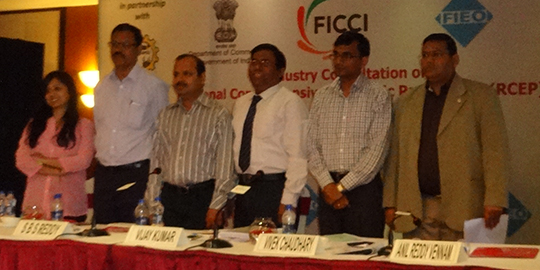
RCEP with China will benefit India, claim Govt officials
Sai Nikesh | The Dollar Business
 Vijay Kumar, Director, Ministry of Commerce and Industry, GoI, Vivek Choudhary, Assistant Director, MoC, S B S Reddy, Regional Joint DGFT-Hyderabad, Anil Reddy Vennam, President, FTAPCCI, among others, at the 'Industry Consultation on RCEP' seminar in Hyderabad on Friday.
Vijay Kumar, Director, Ministry of Commerce and Industry, GoI, Vivek Choudhary, Assistant Director, MoC, S B S Reddy, Regional Joint DGFT-Hyderabad, Anil Reddy Vennam, President, FTAPCCI, among others, at the 'Industry Consultation on RCEP' seminar in Hyderabad on Friday.Given China’s dominance in the world of foreign trade, especially exports, India signing a Free Trade Agreement (FTA) with China or involving China, seems a measured idea from a distance. But, closer observation proves that this elixir of a relationship, guaranteed to induce prosperity for India, is nothing but a sour “poison pill”. It is a well-known fact that the Indian industry has been facing various challenges with Government of India allowing cheaper Chinese products into the country. Be it Chemicals, Glassware, Steel, Tyre, among many others, Chinese products always remained a key concern for the Indian industry and have been facing lot of opposition from the domestic industry. Even after facing lot of anti-dumping duties from the Indian Customs authorities, Chinese products still continue to dominate the domestic industry. Despite taking more and more strict measures to stop Chinese dumps, Indian Government seems to be interested in ‘adding fuel to the fire’, as it wants to sign Regional Comprehensive Economic Partnership (RCEP) with China. This became evident when a key official from the Ministry of Commerce said on Friday that ‘there is a need for the Indian industry to see Free Trade Agreement (FTA) with China in a different way.’ Speaking exclusively to The Dollar Business on whether ‘FTA with China’ would further boost the process of dumping of cheaper material from China into India, Vijay Kumar, Director, Ministry of Commerce (MoC), Government of India said: “Entering FTA with China will offer trade benefits to India. The domestic industry should understand that government has got robust structure to deal with quality concerns and is requested to make necessary representations to get such issues resolved at the earliest.” Kumar was speaking on the sidelines of an industry consultation program on RCEP, organised by the Federation of Indian Chambers of Commerce and Industry (FICCI), Pharmaceutical Export Promotion Council (PHARMEXCIL) and the Ministry of Commerce and Industry (Government of India) in partnership with several export promotion councils & industry associations, in Hyderabad on Friday. “India’s sensitivity towards China is being handled carefully and it is noteworthy to mention that many new ideas related to Rules of Origin (ROO) are being discussed under RCEP,” Kumar said, speaking at the event. “Investments, E-Commerce, Services, are among key matters being consulted under RCEP along with trade in goods,” he noted. Addressing the gathering, Kumar said, “RCEP, Trans-Pacific Partnership (TPP), Transatlantic Trade and Investment Partnership (TTIP) are three major agreements that are going to play major role down the next 20-30 years.” He added: “While TPP and TIPP are led by the United States, two game-changing economies India and China are involved in the RCEP, on which the negotiations started in 2012.” The consultation program focused on the ongoing negotiations under RCEP as the MoC officials sought key suggestions from stakeholders on ‘products of import sensitive nature, products in which India has export potential and desires duty elimination by the partner countries, critical aspect of Rules of Origin and non-tariff barriers impacting India's exports to the RCEP member countries.’ Kumar said that the negotiations under RCEP were being held in a 3-tier approach. ‘FTA utilization, a challenge’ Vivek Chaudhary, Assistant Director, MoC, said, “The main intention of the seminar was to know the stakeholders’ offensive and defensive interests towards the products, especially in case of China.” On a key note, he said, “The main challenge is about the utilization of FTA, which is seen very less among the traders. While the level of utilization is 20% in case of India-Japan FTA, the level is even below 10% in case of other FTAs.” Sidelining certification procedures which are required for trade under FTA, the traders are opting for general route, thus, resulting in less utilization of FTA. The government is making necessary efforts to bring awareness among the traders on FTA, he added. Various stakeholders raised concerns about the domestic industry, especially of the challenges in case of China. ‘Need to focus on ties with Japan’ Experts from various industries like Electronics, Electrical, Engineering component manufacturing, Auto components, Defence Manufacturing, among others, urged the government to take necessary actions on the cheaper material coming in from China. Industry experts were of the opinion that the government should concentrate more on partnerships with countries like Japan, instead of China, which is affecting the domestic industry a lot. What is RCEP? RCEP [also known as "ASEAN+6" FTA] was initiated to have a comprehensive FTA among the 10 ASEAN-nations and 6 partner countries namely, China, Japan, South Korea, Australia, New Zealand and India. The negotiations for concluding the trade pact are in full swing with several rounds of negotiations already concluded. The Government is presently in the process of finalizing the tariff schedules to be taken up in the next round of negotiations.
September 18, 2015 | 5:40pm IST.






 to success.
to success.